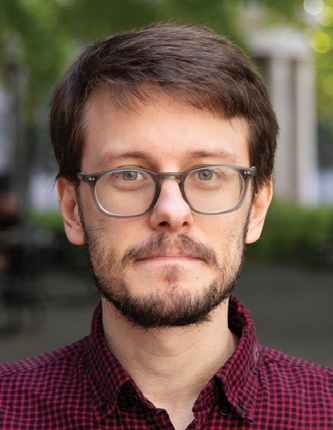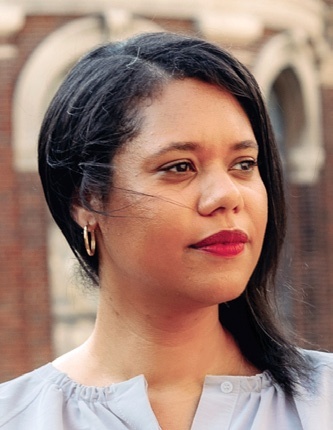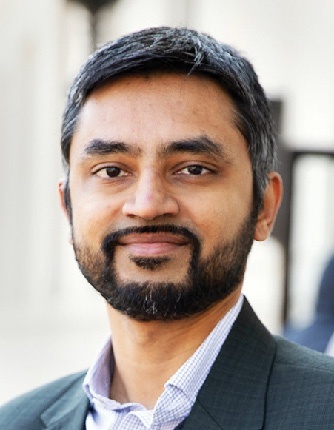Columbia College | Columbia University in the City of New York
Five Professors Share What It’s Like To Teach in the Core
The Core Curriculum has been the cornerstone of a Columbia College education since its inception in 1919. In 2023, we launched the online series “Core Conversations”; each month we speak with a Core instructor to learn what they love about engaging with College students. The series has allowed us to hear firsthand what the curriculum means to the professors and lecturers who are guiding the latest generation, along with how they’re evolving their approaches to suit the world today. Read on for a sampling of what they had to say; check out the full interviews at college.columbia.edu.
LITERATURE HUMANITIES

EMMA ASHER
Lecturer in the discipline of French; has been teaching in the Core for five years, while earning a Ph.D. in French and comparative literature
What is the best part about teaching in the Core Curriculum?
There’s something to be said about encountering first-year students in the moment they come into this university, and having discussions about literature with people who don’t have a predisposition to go to literature courses, and being able to put them in contact with people who are already sold on literature — that particular mix is very cool. The Core really does allow for that in a unique way.
It’s also cool to be able to be there for them — coming into a university as diverse and complex as Columbia, to be able to help them digest it all and help them develop a routine and a sense of community. Lit Hum is often the first real experience of an intellectual community that they have, and it’s often the case that our classrooms are the place where they can breathe a little bit and connect to other people, and talk about books and literature, which is always the kind of ideal that you have as a new college student.
FRONTIERS OF SCIENCE

EMMA ASHER
Lecturer in the Department of Astronomy & Astrophysics; has been teaching in the Core since 2022 as a member of the Columbia Science Fellows program
What are you teaching that feels especially relevant for this year?
How to fact check; or as we say in Frontiers, how to evaluate claims. We live in this incredible era where there’s so much information and it spreads really easily. Social media and the news cover science like they never did before, and now with AI, you can ask questions and immediately get answers. And this is wonderful, but it means there are so many false claims — either maliciously false, or accidentally false, or half false — that really can disrupt lives and political systems. And so I think it’s such an important skill for students, as they use these tools, to realize that the tools are flawed because they were made by humans. This doesn’t mean that we shouldn’t use them, but once we get an answer, we need to pause and think: Does that make sense? If we see a headline and think that it is biased in any way, do we have the skills to fact- check it? I think that’s incredibly important, and I think Frontiers is uniquely posed as a course to be able to do that.
ART HUMANITIES

Associate professor and the Jonathan Sobel and Marcia Dunn Program Chair for Art Humanities; has been teaching in the Core since 2008
What has been your favorite Core Curriculum teaching moment?
It’s something that often happens after the class ends, maybe even a term or two later — I hear from Art Hum students who might be doing nothing related to the humanities, and they tell me, “I now go to a museum with my family and I have something to tell them,” or “I can do art tours with my friends now.” When that happens, I can see the impact of what we are doing in Art Humanities on these very young lives and minds — I would say it’s the aftermath. Those are the moments that I cherish the most.
MUSIC HUMANITIES

EMILY DENNY
Lecturer and composer; has been teaching in the Core since 2020
How do you innovate and/or bring your own spin to Music Hum?
Because I’m a practicing composer, I think that students appreciate my personal perspective about the historical composers we study, and how their contexts and environments influenced the music they were writing. I can speak specifically about writing for orchestra, and so if we’re considering how Beethoven might have felt when he was writing the Fifth Symphony, I can reference how I feel when I’m presenting a new orchestral work for the first time — the insecurities and vulnerabilities, the living, breathing experience of it. It’s great to be able to communicate with that level of detail.
Also, I think on the whole that students generally know about songwriters, but not necessarily about living composers who are writing contemporary classical music. I like that they’re able to ask me about that, or about my colleagues who are musicologists and theorists and might have a personal take about whatever we’re discussing on the syllabus.
CONTEMPORARY CIVILIZATION

EMMA ASHER
Lecturer; Iyengar earned a Ph.D. in Middle Eastern, South Asian and African studies and has been teaching in the Core for three years
How do you innovate and/or bring your own spin to CC?
Because I’m a lawyer, I’ve been able to bring a lot of case law, both ongoing and historical, into my classroom; for example, there’s a lot of Native American case law from the U.S. Supreme Court in the 1820s that’s relevant to the modules on the Conquest of Americas and Locke. I’ve used questions from recent New York Bar exams during our discussions on Aristotle and drawn from Title VII employment discrimination cases in our classes on Race and Gender. Students are obviously not required to know the law, but court cases usefully animate the ethical and moral implications of the theories we study. Sometimes an answer students encounter in a philosophical text from 2,000 years ago turns out to be not very different from the conclusion that a court reached maybe 10–20 years ago.
I also come from a nonprofit background — I used to represent tenants in housing court and I worked at various NGOs in India — so I think I bring that sensibility about justice into my course. And thirdly, I’m a person from South Asia, which has both a violent and exploitative colonial past, and, for the last decade, a right-wing majoritarian party in power in India. I use this history as a pedagogical resource — South Asian events sometimes offer a neutral ground for students in my class to work through their ideas.
Issue Contents
Published three times a year by Columbia College for alumni, students, faculty, parents and friends.
Columbia Alumni Center
622 W. 113th St., MC 4530, 6th Fl.
New York, NY 10025
212-851-7852
cct@columbia.edu
Columbia Alumni Center
622 W. 113th St., MC 4530, 4th Fl.
New York, NY 10025
212-851-7488
ccalumni@columbia.edu

